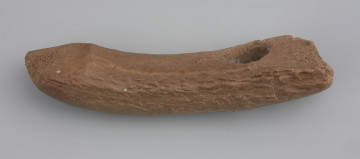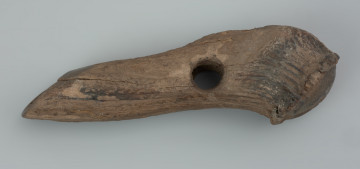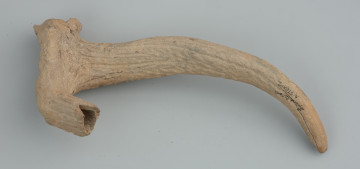
Hoe
9600 p.n.e. — 5400 p.n.e.
National Museum in Szczecin
Part of the collection: Stone Age
The antler frame of a red deer was discovered in the Oder River near Inoujście, the Goleniów district, in the Iński Nurt Canal near Mewia Island in the 1960s. It found its way into the collection of the National Museum in Szczecin in the 1970s. It was made from antler drop is evidenced by the lack of skull remains at the rose. Considerable damages to the surface and edges indicate that it was intensively used for a long time as a frame and as a hammer. Such items were used to embed flint tools (punches or picks). The advantage of this solution was the modular construction of the tool. When one element was destroyed, it was easy to replace it with another instead of creating a new tool from scratch. In addition, using a tool holder has a positive effect on reducing vibrations and overload to which the tool head and shank are subjected. As a result, both components are less likely to be damaged. All these factors mean that antler holders have often been used for the most demanding jobs. It is also worth remembering that antler is a relatively easy material to work with (once softened, it can easily be cut with flint tools) and is also very durable and widely available in forest environments. Objects composed of several different raw materials are called composite tools. Their use is a characteristic feature of the technological traditions of the hunter-gathering communities that settled the forests of northern Europe after the last glacier receded.
Michał Adamczyk
Author / creator
Dimensions
cały obiekt: height: 18.6 cm, width: 5.8 cm
Object type
mount (fitting)
Technique
cutting, drilling, breaking, setting, chopping, softening
Material
red deer antlers
Origin / acquisition method
donation
Creation time / dating
Creation / finding place
Owner
National Museum in Szczecin
Identification number
Location / status

9600 p.n.e. — 5400 p.n.e.
National Museum in Szczecin

7000 p.n.e. — 5400 p.n.e.
National Museum in Szczecin

9600 p.n.e. — 5400 p.n.e.
National Museum in Szczecin
DISCOVER this TOPIC
Castle Museum in Łańcut
DISCOVER this PATH
Educational path